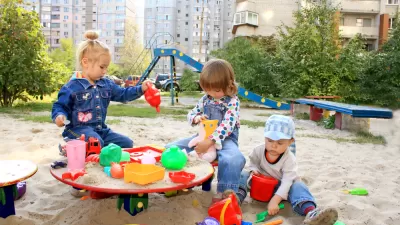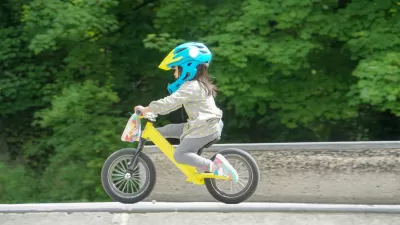Designing thoughtful, child-friendly public spaces can ease the burdens of modern parenting and offer safe spaces for children to learn self-reliance and resilience.

In an article in Bloomberg CityLab, Alexandra Lange argues that cities should build more spaces that are safe and friendly to children and families.
According to Lange, “Parenting experts say children need to learn independence and resilience. But cities and suburbs don’t offer safe pedestrian and bike routes to school, malls kick teenagers out on the weekends, and free time disappears under a spreadsheet of activities.” Parents, meanwhile, have to find ways to shuttle their kids to various places, often with few options other than driving.
Lange points to examples dating back as far as the early 20th century, when planners more consciously began trying to design safe, connected, family-friendly neighborhoods. She also lists ways cities can encourage family-friendly spaces without changing their existing housing stock: “Widening sidewalks, closing streets for play on afternoons and weekends, adding speed humps and opening schoolyards after hours can immediately provide the same ease for impromptu hang-outs, with even more potential playmates.”
Lange points out that, even if you don’t have children, “most of the amenities that would make having a family easier benefit everyone. You might not care about slow streets, shaded benches, or walkable shops now, but you are one pregnancy, knee operation, or visit from an older relative away from becoming suddenly, even painfully, aware of the location of every bench, elevator, ramp and bathroom on your daily commute.”
FULL STORY: Burned Out Parents Need Better Public Spaces

Maui's Vacation Rental Debate Turns Ugly
Verbal attacks, misinformation campaigns and fistfights plague a high-stakes debate to convert thousands of vacation rentals into long-term housing.

Planetizen Federal Action Tracker
A weekly monitor of how Trump’s orders and actions are impacting planners and planning in America.

San Francisco Suspends Traffic Calming Amidst Record Deaths
Citing “a challenging fiscal landscape,” the city will cease the program on the heels of 42 traffic deaths, including 24 pedestrians.

Defunct Pittsburgh Power Plant to Become Residential Tower
A decommissioned steam heat plant will be redeveloped into almost 100 affordable housing units.

Trump Prompts Restructuring of Transportation Research Board in “Unprecedented Overreach”
The TRB has eliminated more than half of its committees including those focused on climate, equity, and cities.

Amtrak Rolls Out New Orleans to Alabama “Mardi Gras” Train
The new service will operate morning and evening departures between Mobile and New Orleans.
Urban Design for Planners 1: Software Tools
This six-course series explores essential urban design concepts using open source software and equips planners with the tools they need to participate fully in the urban design process.
Planning for Universal Design
Learn the tools for implementing Universal Design in planning regulations.
Heyer Gruel & Associates PA
JM Goldson LLC
Custer County Colorado
City of Camden Redevelopment Agency
City of Astoria
Transportation Research & Education Center (TREC) at Portland State University
Jefferson Parish Government
Camden Redevelopment Agency
City of Claremont





























